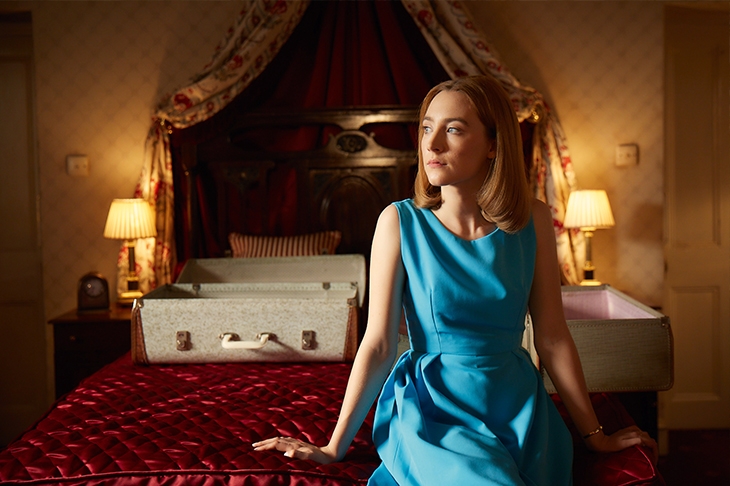On Chesil Beach is an adaptation of the Ian McEwen novella set in 1962 when ‘conversation about sexual difficulties was plainly impossible’ and a young couple suffer a disastrous wedding night from which there will be no return. This is surefooted, mostly, and literary and tasteful and sad and English, and it also stars the ever-remarkable Saoirse Ronan. But it does take a giant misstep at the end — the ending is plainly horrible — plus the book’s frustrations don’t magically disappear. One crap shag and that’s it, it’s over? It worried you then and it will worry you now.
Adapted by McEwan, and a first film directed by Dominic Cooke, who has a theatre background, this opens with our couple, Florence (Ronan) and Edward (Billy Howle), arriving at a Dorset seaside hotel for the first night of their honeymoon. They are virgins. They are scared, nervous. They circle each other shyly. The waiters who serve them dinner in their room — one of the small joys of this film is the silver service of the time; melon boat! — are all but tittering. It is excruciating, for us and for them, but also tender and compassionate and funny. You’re invested, straight off the bat. Oh God, please let it be all right for them this time, I found myself praying. But then I always hope that for Romeo and Juliet. I’ll never learn.
The hotel room remains the focus, but who they are, and how they met, is told via flashbacks, some successful, some not so much. She’s a classical violinist from a well-to-do family while he is a history graduate from lower down the social scale. Along the way there are delicious cameos from Samuel West and Emily Watson as her parents, Adrian Scarborough and Anne-Marie Duff as his. When the narrative is faithful to the original story — for instance, the waiters (melon boat!) or when we learn how Edward’s mother became brain-damaged or Florence reads out that sex manual to her little sister, with absolute horror — the film feels true to itself, but when it veers, it can lose its footing and plummet headlong into sentimentality. Invented scenes have been included, presumably to pad it out — the book is only 166 pages — and Florence’s bonding with Edward’s family, for example, is so schmaltzy it’s as if such scenes had been air-lifted in from a different enterprise entirely. The Waltons, say.
But it is surefooted mostly, and always watchable, and you carry on caring and hoping and praying, even if the characters do end up being slightly distant and beyond our reach. It’s hinted that Florence suffered sexual abuse as a child, which is why she’s so disgusted by sex. But if that is the case, how did she overcome it in later life, as we see that she did? Still, Ronan is a wonder. So much of this film relies on what isn’t being said, and with just a tiny, fleeting twitch she can say exactly what isn’t being said at any given time. It is miraculous. Meanwhile, Howle is tragic and dashing and will put you in mind of a young Michael York, which is never a bad thing. But the ending. Oh my, the ending. This, again, takes us where the book never did and involves old age and ghastly prosthetics and tears trickling down cheeks, and whoever signed off on this deserves a good thrashing.






Comments